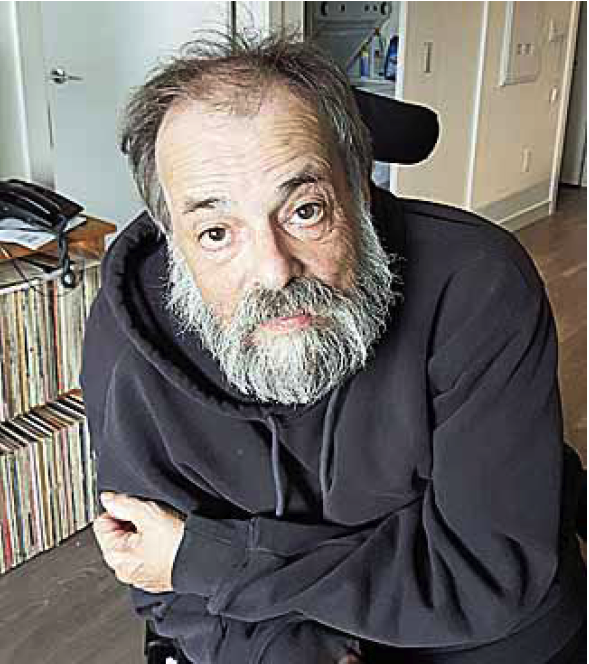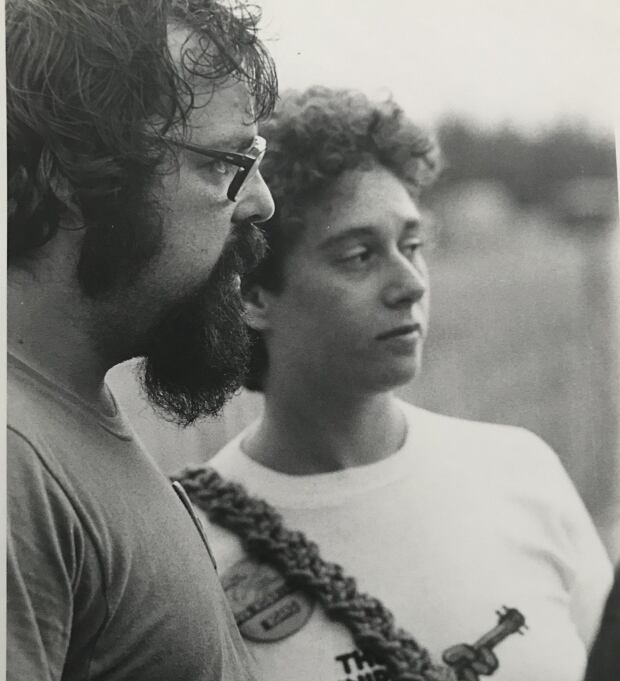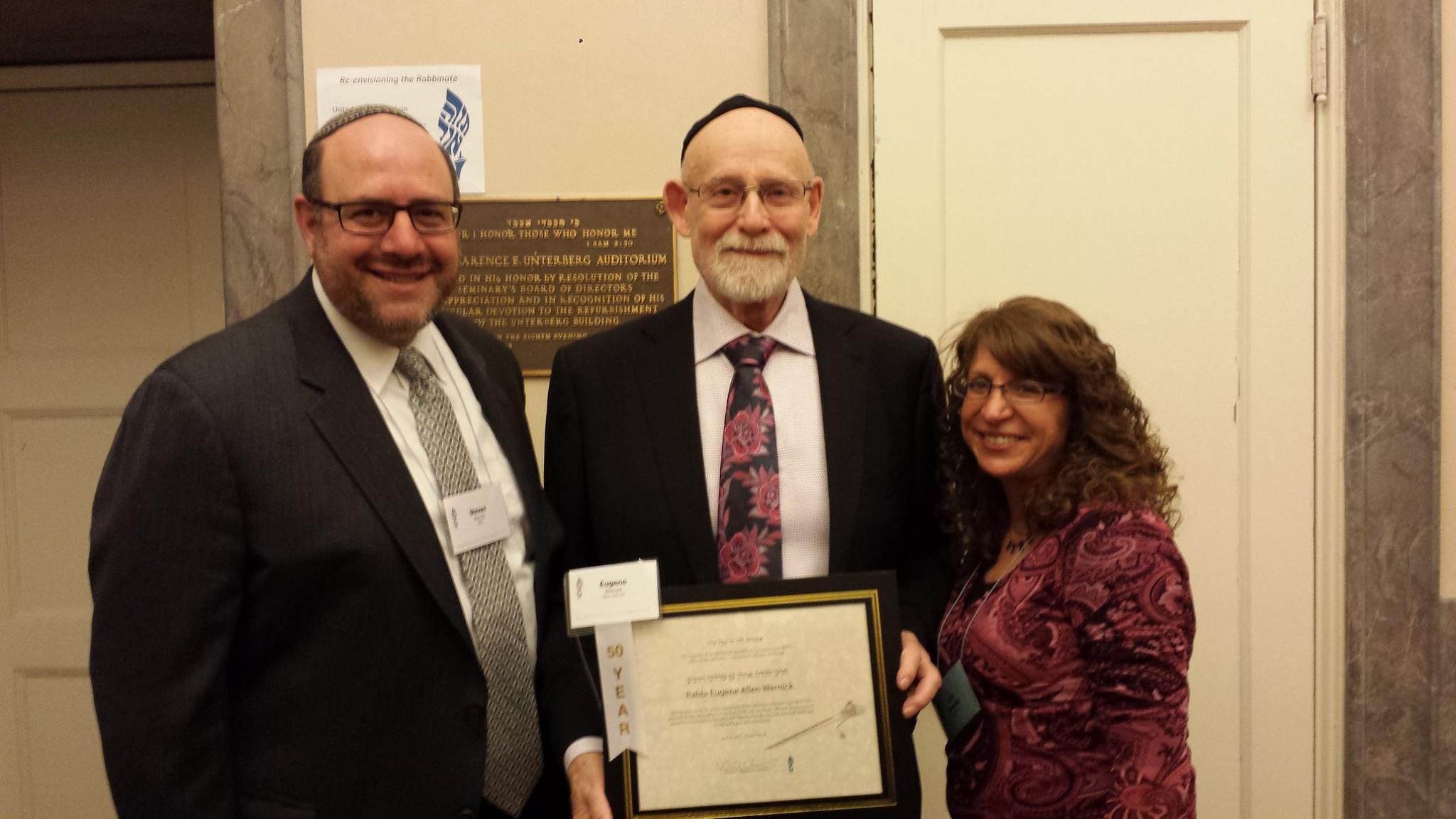Features
Mitch Podolak: ‘A Citizen of Earth’

By KINZEY POSEN (Ed. note: This story first appeared in the October 11, 2017 issue of The Jewish Post & News. With the Annual Winnipeg Folk Festival about to celebrate 50 years since its inception – and which MItch helped create – along with his wife Ava Kobrinsky and Colin Gorrie, we thought it an appropriate time to reprint Kinzey’s moving tribute to Mitch.)
Last November Mitch Podolak was leaving one of his favourite Winnipeg restaurants, the Evergreen on Pembina, when he suddenly fell outside. As he lay there somewhat stunned, he realized that this fall was about to change his life. He couldn’t feel the lower part of his body after landing hard on his neck.
Fast forward to September 2017 and I’m sitting with Mitch in his apartment on Sterling Lyon Parkway in Tuxedo. He just turned 70 on September 21st. When I said, “Imagine, Mitch Podolak living in Tuxedo,” he quickly says, “It’s the wrong side of the tracks.”

In a way I guess he’s right – you can see and hear the rail line close up from his window and Ikea is across the road. He and his wife, Ava Kobrinsky, moved there after he was released from the hospital in April of this year. They still have their home in Wolseley, but Mitch can’t negotiate the stairs and living on one floor is the way to go for now. These days, Mitch uses a motorized wheelchair to get around and his apartment has specialized equipment to help him stand and perform his physiotherapy. He admits he loves the exercise.
Mitch has come a long way from that fateful day last November and can now stand on his own, walk unaided for a short distance, and has regained much of the feeling in his body. There’s still a long way to go to be considered normal, but he’s confident that by the end of this year, he’ll be more mobile.
For those who know him, Mitch’s name is synonymous with the Winnipeg Folk Festival, the Edmonton and Vancouver Folk Festivals, the West End Cultural Centre, The Stan Rogers Festival in Canso, Home Routes… the list goes on. He’s also well known for his political action and work in trying to bring about change. His efforts have led to his being awarded an Honourary Doctorate from Brandon University and the Order of Manitoba from the Province.
When Mitch had to attend the award’s ceremonies, he knew that he had to wear something a bit more sophisticated than his usual black T shirt and jeans. He called up friend and magician Brian Glow to be his fashion consultant. After spending $600 on a dapper black suit, black shirt and silver tie, Mitch shocked many by appearing in his new clothes.
So how did Mitch come to be where he is now, a veritable living legend – a man with more stories to tell than a recovering addict at a 12 step meeting?
It all started in Toronto in 1947, when he was born to Rhoda Layefsky and Noach Podolak. His dad was 20 years older than his mum. Mitch is the youngest of three children – after Alice, the oldest, who lives in Cape Breton, and his brother Mark, a retired Treasury Board Analyst in Ottawa, who’s known as the “white sheep” of the family.
The Podolak family lived on Major Street, in a neighbourhood full of Jews and Europeans located between Bathhurst and Spadina. His father Noach, originally from Poland, was a housepainter, who also did theatrical sets for the Yiddish Theatre in New York for a period of time and was a friend of the well known Jewish actor, Paul Muni. His mum Rhoda was a strong, loving woman, who was born in Canada. Her dad, Mitch’s grandfather Avram Liebe, played a special role in his life and was his hero. The two had a special relationship. During the Spanish Civil War, Rhoda was an organizer for the Friends of the Mackenzie-Papineau Battalion.
Both Mitch’s parents were passionate socialists and he grew up in a rich atmosphere full of fervent political discussions. Mitch’s dad was a member of the Communist Party, but pulled out of the organization in 1956, over the invasion of Hungary and anti-Semitism in the Soviet Union. It was also the year he died, when he was only 56. Mitch was only nine years old at the time and Rhoda, who was now widowed in her thirties, turned her energy to providing for her three kids. She worked as a bookkeeper and remained a widow until her passing in 2005.
At the age of seven, Mitch started to learn how to play the clarinet. The lessons were classical and he really didn’t like it. Although he grew up in an era when rock & roll was making its debut and was just beginning to move the world in a different direction, Mitch was destined to follow a different musical path altogether. When he was 13, his older sister Alice had two tickets to go to a concert at Massey Hall with a guy who was a no-show. Instead, she took Mitch, who thought his sister was going to take him to the symphony. To his surprise, it was to a concert that forever changed his life. The featured performer was folk legend Pete Seeger and young Mitch was simply awestruck, especially by one song. On the way home, Alice explained to him what that particular piece, the “Bells of Rhymney,” was about and what the performer was trying to get across to the audience. He connected with the songs in a way that was new and liberating. Since that day, Mitch has become an ultra passionate supporter and fan of folk music, the kind we call “singer songwriter” now. Along the way, he also learned how to play the banjo quite well.
Mitch comes by his musical ability quite honestly. His uncle Philip on his dad’s side was the conductor of the Polish Army Symphony and his dad, Noach, played the clarinet.
Growing up in a very socialist family, Mitch was sensitive to the actions of the McCarthy era. He recalled two television shows in the fifties that were anti-Communist: “The Man called X” and “I Led Three Lives.” Both seemed to have the communists meeting in basements, with peeling paint and bare wire light bulbs hanging from the ceiling. The plots were often about how to recruit new members and sabotage buildings. On the walls there were portraits of Marx, Lenin, Engels, and Stalin, and they all spoke in bad Russian accents.
As Mitch’s awareness of how socialism could benefit society deepened, he recalled one event that sticks with him till today. It was seeing a hungry man eat chicken out of a garbage can – an image that’s put much into perspective for him.
In 1961, at the age of 14, he joined what was known at the time, as the Y.S.A – the Young Socialist’s Alliance, in Toronto – a Trotskyite youth movement, where everyone called each other “comrade”. Mitch was the youngest member by only a few months. When he first attended a meeting, much like the TV shows, there were portraits on the wall of Marx, Lenin and Engels, but instead of Stalin, there was Leon Trotsky. His involvement gave him the tools and inspiration to engage in socialism and later the anti Viet Nam war movement. Around that time, he met Harry Paine at a movement meeting – a man who would go on to become one of his best friends.
In 1968, Mitch made the move to Winnipeg to study as a mature student at the University of Manitoba and specifically do political organizing. He also established the Vietnam Mobilization Committee. Mitch recalled one particular scene during this period, when he and his friend, Joe Flexer, organized a major event at the U of M. They wanted to go to the Dow Chemical Company’s recruitment centre on campus to demonstrate. At the time, Dow was one of the manufacturers of napalm, a rather nasty incendiary weapon used in Viet Nam against the Viet Cong and innocent people. It would stick to the skin and cause severe burns.
In anticipation, Mitch and Joe went to a hardware store and bought the biggest chains and padlocks they could find to lock the doors to the centre. After entering and insisting they be able to talk to the Human Resources manager, he eventually came out to hear their statement. It was Joe Flexer who yelled out, “Our statement is, get the f_____ off our campus you war-mongering c__k s___s!”
That’s when the situation escalated. The manager went back into the building and the protestors pulled out the lock and chains to stop people from entering and exiting. Soon, there were a thousand people and fights began to break out. As Mitch recalls, it was a crazy time. Mitch recalls that his salary as an organizer was a hundred dollars a month.

In 1970, he left Winnipeg and began to do more political work in Halifax. It was during that time that Mitch first met Winnipegger Ava Kobrinsky, his wife of 40 plus years. They met in 1971 at the Trotskyist Hall in Toronto and were soon married. They returned to Winnipeg in 1972 when Mitch was 24.
Two years later, Mitch co-founded the Winnipeg Folk Festival with Ava and Colin Gorrie and his life took on a completely different dimension. Over the years, his expertise and vision helped establish almost all of the major folk festivals throughout Western Canada, plus others in Ontario and the Maritimes. He was a bona fide Folk Festival consultant.
As we talked, the subject shifted to music and Mitch showed me how he couldn’t use his left hand any more to play the banjo. Some of the fingers had lost their feeling and were also muscle damaged. He used his electric wheelchair to move over to his desk and grabbed a harmonica. He blew a few fat notes and told the story of how he came to play.
One night, while still in the hospital, at around 10:30 pm Mitch was in bed. He was startled to hear a familiar voice asking people outside his room, “Where’s Mitch?” when suddenly, well known blues musician, Big Dave McLean barged in.He handed him a harmonica and in his gruff voice said, “Here, learn how to play it,” and quickly left.
His multi-month experience in the Health Sciences Centre taught him several things. He can’t say enough about the doctors, nurses and staff who touched him through their professionalism, dedication and caring. He reflects a lot about what will happen with the impending cutbacks and what will happen when more baby boomers enter the system.
Back in January, Mitch’s good friend , singer, songwriter, and artist, Heather Bishop, organized a crowdfunding initiative to help finance necessary renovations to his home. It’ll allow him to live there eventually.
The goal was $20,000. It went live on Thursday and by Friday, the goal had been reached. Mitch was deeply touched by the outpouring of good wishes, stories and funds. It’s something he’ll never forget.
I asked Mitch if he had any regrets so far in his 70 years and his response was an immediate: “None.” I then asked what he was most proud of and he said, “The work we did to help stop the war in Vietnam, the West End Cultural Centre,” and, he added, the numerous folk festivals he established. Then, pausing for a few seconds, he smiled in his chair and said,“I’m proud of my relationship with my wife, our partnership, and my children.”
“Ava is an unsung hero, brilliant at organization, without her, none of this would have happened,” he added.
It’s not difficult to see what drives Mitch Podolak in terms of inspiration.
Basically, it’s two things: politics and music – in no particular order. It’s where it started for him and where he continues to flourish and contribute as a human being.
Mitch is constantly thinking of where to go next. His medical problems as a human being have given him plenty of time for introspection and he wards off any negativity by staying focused on his projects. His body may have slowed down, but his brain doesn’t rest.. The power of a moving lyric tied to a melody never fails to move him. Pair that with his love of freedom, justice and “menshlechkeit,” and you realize that what his family inculcated him is ever present.
He has three major projects he’s working on right now. One of them is a book entitled “Passing Through.” It will consist of 71 essays of people he has known throughout his life, including: his Uncle Meyer, who jumped off
the train on the way to Auschwitz, but whose family refused to follow him; his Zeida Avram Leibe – his mum’s dad whom he idolized and who taught him how to play gin; plus Mitch’s very close friends, Joe Flexer and Harry Paine, among 67 others.
Throughout the years, Mitch has kept in touch with his siblings, cousins, nephews and nieces. He appreciates family and the connections it brings. He calls it the core Podolak: people caring about other people.
I ended our conversation by asking Mitch how he feels about being a Jew. His Hebrew name is Melech which, of course, means king – and he likes the name. His mum Rhoda often used it: “Melech Ben Noach”, a.k.a. Mitch Podolak. Suffice to say, you’re not going to find Melech at any of the synagogues on Yom Kippur or on any other holidays. He loves the culture, the food, the music, the humour, but he’s an avowed atheist. He’s well aware of Jewish values and ethics and uses them to form his vision of a better world, especially the aspects of brotherhood and sisterhood. When it comes to Israel, Mitch has hopes of it becoming a socialist country, in the context of a socialist Middle East in which all Semites are equal and united in making a better world. In his way, Mitch Podolak has found a path to peace.
At the age of 70 and having to undergo a traumatic health setback, he’s remarkably selfless, stubborn, surprisingly traditional, and ever hopeful and optimistic. In fact, these days, at a time when his injuries won’t allow him to play his beloved banjo, Mitch says, “At least I can sing badly!”
(Ed. note: MItch Podolak passed away in August 2019.)

Features
Three generations of Wernicks all chose to become rabbis

By GERRY POSNER Recently I was at a Shabbat service at Beth Tzedec Synagogue in Toronto and the day unfolded in some unexpected ways for me.
It began when I was asked to be a Gabbai for the service, that is to stand up at the table where the Torah is placed and to check the Torah reading to make sure there are no errors. I have done this before and it has always gone smoothly. I attribute that fact in large part to the Torah reading ability of the reader at Beth Synagogue. He is fast, fluent and flawless. Well, on this particular day after he had completed the first two portions, he began the shlishi or third aliyah. I could not find his reading anywhere. It was as if he had started somewhere fresh, but not where he was supposed to be. I looked at the other Gabbai and he did not seem to recognize what had happened either. So, I let it go. I had no idea where the Torah reader was. He then did another and still I was lost. He came to what was the 6th aliyah when a clergy member walked over to him and indicated to him that he had read the fourth and fifth aliyah, but that he had missed the third one. The Torah reader then said to me “this is what you are here for.” Now, it might have been one thing if I had missed it entirely. Alas, I saw the error, but let it go as I deferred to the Torah reader since he never makes a mistake. He ended up going back to do the third aliyah before continuing on. This was a very unusual event in the synagogue. I felt responsible in large part for this gaffe. A lesson learned.
The feeling of embarrassment was compounded by the fact that on this particular day the service was highlighted, at least for me, because of the rabbi delivering the sermon. This rabbi, Eugene Wernick, was none other than the father of my present rabbi, Steven Wernick of Beth Tzedec Synagogue. He was also the same rabbi who was the rabbi at Shaarey Zedek between 1979-1986 and who had officiated at my father’s funeral in 1981, also a few years later at my oldest son’s Bar Mitzvah in Winnipeg in 1984. As I listened to him speak, I was taken back to the 1980s, when Rabbi Gene was in the pulpit at Shaarey Zedek. Of course, he is older now than in his Shaarey Zedek days, but the power of his voice was unchanged. If anything, it’s even stronger. As in the past, his message was relevant to all of us and resonated well. Listening to him was a treat for me. Still, my regret in not calling out the mistake from the Torah reading was compounded by the fact that I messed up in front of my former rabbi, Eugene Wernick – never mind my present rabbi, Steven Werinck.
On this Shabbat morning, aside from all the other people present, there were not only the two Rabbis Wernick, but one Michelle Wernick was also there. Michelle, daughter of Rabbi Steven Wernick, is a first year student at the Jewish Theological Seminary. She is following in the family business – much like with the Rose rabbinical family in Winnipeg.
As it turned out, there was a Bat Mitzvah that day. And the Bat Mitzvah family had a very real Winnipeg connection as in the former Leah Potash, mother of the Bat Mitzvah girl, Emmie Bank and the daughter of Reuben and Gail Potash (Thau). It occurred to me that there might be a few Winnipeg people in the crowd. As I scanned the first few rows, I was not disappointed. Sitting there was none other than Chana Thau and her husband Michael Eleff. I managed to have a chat with Chana (even during the Musaf service). In the row right behind Chana and Michael was a face I had not seen in close to sixty years. I refer to Allan Berkal, the eldest son of the former rabbi and chazan at Shaarey Zedek, Louis Berkal. I still remember the first time I met Allan at Hebrew School in 1954 when his family moved to Winnipeg from Grand Forks, North Dakota. That was many maftirs ago. So this was another highlight moment for me.
Of course, there are other Winnipeggers who attend Beth Tzedec most Shabbats. I speak of Morley Goldberg and his wife, the former Marcia Billinkoff Schnoor. As well, Bernie Rubenstein and his wife, the former Sheila Levene were also present for this particular Shabbat. In all, this Shabbat had a particularly Winnipeg flavour to it. Truth be told, you do not have to go far in Toronto at any synagogue and the Winnipeg connections emerge.
Features
In Britain Too, Jews Are in Trouble

By HENRY SREBRNIK Antisemitic attacks in Britain have surged to levels unseen in decades, with Jewish schools under guard and synagogues routinely targeted. Jews suffered the highest rate of religious hate crimes in the year ending March 2025, according to interior ministry data. And it has only become worse.
Jewish Post and News readers know, of course, about the attack on Jewish worshippers at the Heaton Park Synagogue in Manchester at Yom Kippur services on October 2, 2025. The attack killed Adrian Daulby, 53, and Melvin Cravitz, 66, and left three others injured.
Greater Manchester Police Chief Sir Stephen Watson said fear within the Jewish community had risen sharply, with even young children asking for armed police protection to simply attend Hanukkah parties.
While the blame for the violence lies with the assailant, an immigrant from Syria, who was shot dead by police, the responsibility for the circumstances in which two Jews died and where a Jewish community that has contributed loyally to British society for centuries fears for its existence lies with the leaders of the British establishment.
The Labour government, many of whose supporters and elected representatives flirt with pro-Hamas positions, has fueled the flames with its denunciations of Israel’s war and recognition of a Palestinian state. Many younger people, their minds filled with postmodern “anticolonialist” left ideology, are eager recruits to the cause.
Ruth Deech is a British academic, bioethicist and politician who sits in the House of Lords. Ten years ago, she warned that some of the country’s top universities had become “no-go zones” for Jewish students. But, in the wake of the October 7 atrocities and ensuing war in Gaza, she believes the situation is much worse.
“The warfare on the streets is being continued in the universities,” Deech told the Times of Israel Dec. 25. “The universities on the whole are not facing up to it, and the University of London campuses are probably amongst the worst. None of the vice chancellors seem to be able to summon up the courage to deal with it,” Deech contends.
“They take refuge behind freedom of speech, without realizing that freedom of speech stops where hate language begins.” Deech is highly critical of Oxford, where she has spent much of her academic life. British universities must take stronger action to protect Jewish students and use every tool available to confront hate and division.
But the reaction by authorities has generally been one of appeasement. For years, police refused to enforce hate-crime laws. Universities tolerated mobs chanting for Israel’s destruction. Politicians equivocated in the name of “balance.”
For instance, in Birmingham, the West Midlands Police, which cover the city, classified as “high risk” a soccer match between Maccabi Tel Aviv and Aston Villa on Nov. 6. The police cited “safety” as the reason for banishing fans of the Tel Aviv team, which now seems to be standard when unjustified bans are put in place.
As the Jewish Leadership Council noted on X, “It is perverse that away fans should be banned from a football match because West Midlands Police can’t guarantee their safety.” Prior to the event, masked men hung “Zios Not Welcome” signs in the windows of shops or restaurants. “Zio,” of course, is a not-so-coded word for Israelis and/or Jews.
Over the past two years, the Board of Deputies of British Jews, the country’s main representative body for the Jewish community, has faced questions of their own about how to conduct debates on Israel. Last April, 36 of the board’s members signed an open letter, which was published in the Financial Times, protesting against “this most extremist of Israeli governments” and its failure to free the hostages held since October 7. “Israel’s soul is being ripped out and we fear for the future of the Israel we love,” the letter read.
Five members of the Board were suspended for instigating the letter. The Board’s Constitution Committee found that they had broken a code of conduct by creating the “misleading impression that this was an official document of the Board as a whole.” But for some, the letter represented a watershed moment where some of the conversations about Israel happening in private within the Jewish community could be had in public.
Board President Phil Rosenberg argued that there has long been healthy debate among the 300 deputies. His primary concern is the safety of British Jews but also how the community sees itself. “We have a whole range of activities to confront antisemitism,” he maintained. “But we also believe that the community needs not just to be seeing itself, and to be seen, through the prism of pain.
“It already wasn’t right that the only public commemoration of Jewish life in this country is Holocaust Memorial Day. And the only compulsory education is Holocaust education. Both of these things are incredibly important, but that’s not the whole experience of Jews.”
Given all this, a new political party divide is emerging among British Jews, with support rising fast for the left-wing Greens, now led by Zack Polanski, who is Jewish, and buoyed by younger and “anti-Zionist” Jews, while the older Orthodox turn to Nigel Farage’s upstart right wing Reform UK, as trust in the two main parties collapses.
Support for Labour and the Conservatives among British Jews had fallen to 58 per cent by July 2025 from nearly 84 per cent in 2020, according to a November 2025 report from the Institute of Jewish Policy Research (JPR), entitled “The End of Two-party Politics? Emerging Changes in the Political Preferences of British Jews.”
Labour has been typically favoured by more “secular” Jews while the Conservative party is traditionally preferred by more “observant” Jews. But for the first time in recent British Jewish history, support for the Labour and Conservative parties combined has fallen below 60 per cent.
“Reform UK is more likely to attract male, older, orthodox, and Zionist Jews; the Greens are more likely to attract younger, unaffiliated and anti-Zionist,” according to Dr. Jonathan Boyd, JPR’s executive director. The surge in Jewish support for Reform UK, a party whose rhetoric on immigration and nationalism would typically be expected to alienate minority communities, including Jews,” was described as “striking” by the JPR.
“Significant parts of the Jewish population may gravitate toward voices promising strength and clarity, regardless of ideological baggage” when mainstream parties were perceived as “weak or hostile,” the report added. “It may signal a structural shift in Jewish political identity.”
Three forces appear to be driving this fragmentation: the war in Gaza and its polarising effect on Jewish attitudes; rising antisemitism, culminating in the Heaton Park Synagogue terrorist attack; and a broader collapse of trust in mainstream parties.
“Together, these factors are pushing Jews toward parties that offer clarity — whether through populism or radical progressivism. If recent developments persist,” the report suggested, “British Jews are likely to become more politically polarised, prompting further internal community tensions.”
Henry Srebrnik is a professor of political science at the University of Prince Edward Island.
Features
How Hit And Run Accidents Highlight The Need For Stronger Road Safety Measures

A sudden impact followed by the screech of tires fading into silence leaves a person in a state of shock and confusion. These incidents occur across modern road networks and can profoundly affect victims, especially when the responsible party leaves without rendering aid.
Why does this behavior persist despite modern surveillance technology and increased legal penalties? These incidents highlight gaps in infrastructure and the need for stronger safety protocols to better protect vulnerable road users and improve accountability.
What Role Does Infrastructure Play In Preventing Driver Flight?
Designing roads that naturally encourage slower speeds and higher visibility can significantly reduce the likelihood of a driver attempting to flee. Proper engineering promotes lower speeds and better visibility, supporting safer behavior and easier incident documentation.
Improving Street Lighting Systems
Visibility is a primary factor in both accident prevention and suspect identification. Bright, well‑placed LED lighting can improve visibility for witnesses and cameras, making identification more feasible at night.
Implementing Traffic Calming Measures
Speed humps, roundabouts, and narrowed lanes are associated with lower speeds in pedestrian‑heavy areas. When vehicles move more slowly, impact severity tends to decrease, and immediate flight becomes more difficult.
Expanding Automated Enforcement Cameras
License plate recognition technology acts as a silent sentry on busy intersections. These systems can furnish critical investigative leads, increasing the likelihood of identifying vehicles involved in recorded incidents.
Why Do Hit-and-Run Incidents Increase Despite Modern Technology?
Even with expanded surveillance in many areas, some drivers believe they can avoid consequences after a collision. In cities like Charlotte, where traffic crashes rose by 9 percent in 2025, the psychological urge to flee often overrides logic when panic or impairment sets in. Practitioners frequently observe cases where split-second decisions lead to prolonged legal proceedings, underscoring that technology can aid investigations but does not always prevent offenses. A Charlotte hit-and-run accident lawyer reconciling with precision at StewartLawOffices.net provides a way for victims to understand the available legal avenues, as nationwide fatalities have risen significantly over the last decade.
Furthermore, current data suggests that while high-definition cameras capture more incidents, they often lack the immediate deterrent effect needed to stop a driver from leaving the scene in the heat of the moment. This disconnect between surveillance and behavioral prevention highlights a significant gap that technology alone has yet to bridge. Locals in Charlotte, facing such trauma, can visit Stewart Law Offices, located at 2427 Tuckaseegee Road, on 6 minutes drive from 4th Street Ext, near Frazier Park, for a free consultation, or can call 704-521-5000 to seek guidance on their situation.
Which Misconceptions About Hit And Run Investigations Persist?
A common myth is that if there are no witnesses, the driver will never be found. Many believe that “no face, no case” applies to collisions on quiet streets. However, modern forensics and digital footprints tell a very different and more complex story.
Paint transfer, vehicle parts, and other physical evidence can help narrow vehicle make/model and potentially identify suspects when combined with other investigative leads. The idea that a driver can simply disappear into the void is a dangerous fallacy that ignores the complexity of modern investigation techniques and the ubiquity of digital evidence.
How Can Better Public Policy Improve Survival Rates?
Legislative changes can bridge the gap between a collision and life-saving medical intervention. Policies that improve rapid emergency response during the “Golden Hour” can positively influence outcomes for injured parties.
Mandatory Good Samaritan Education
Including basic first aid and emergency reporting in driver education can improve public readiness and may encourage more responsible behavior after collisions.
Enhancing Alert System Integration
Similar to Amber Alerts, “Yellow Alerts” can be broadcast to notify the public about a vehicle involved in a hit and run. This rapid dissemination of information turns every citizen into a potential witness.
Increasing Penalties For Non-Compliance
Sentencing guidelines, higher fines, and license consequences can align penalties with offense severity and may deter some would‑be offenders.

What Practical Steps Should Be Taken Immediately After A Collision?
Safety is the priority. If a vehicle strikes another and flees, move to a secure location if possible. Calling emergency services promptly initiates a report and can expedite medical assistance.
Elizabeth VonCannon, a Charlotte hit and run accident lawyer, emphasizes that documenting the scene with photos of the damage and the surrounding area can provide clues later. Even small details, like the direction the fleeing car headed or the color of its paint, can be the missing piece for law enforcement to find them.
Frequently Asked Questions
Does insurance cover damage if the other driver is never found?
Uninsured motorist coverage may apply to repairs and medical expenses in hit‑and‑run cases, depending on your jurisdiction and policy terms.
What information is most helpful to record after an accident?
Try to note the license plate, vehicle make, model, color, and the direction the driver fled the scene.
Can a driver be charged with a felony for fleeing?
Yes, if the accident involves serious bodily injury or death, the act of fleeing is often classified as a felony.

